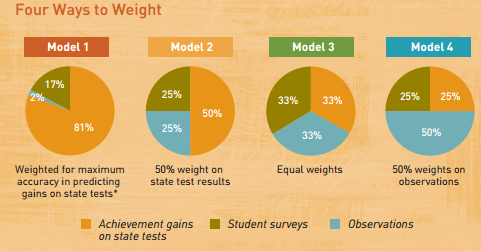No one would argue that the quality of teaching influences learning outcomes. However, evaluating teachers has remained extremely challenging. In real life, teachers regarded as good are associated with high student performance. The question is whether the above average performance of these students truly comes from better teaching or from the fact that these students are good at the beginning. There is no doubt that a teacher would prefer teaching highly motivated students. In a competitive world, good schools are more able to attract good teachers. These schools also tend to be more selective in admitting students. Thus, the question remains; Is the good performance due to excellent teachers, or is it due to excellent students?
The Bill and Melinda Gates Foundation has been funding for the past three years a project that aims to decipher how teachers should be evaluated. The project called, "
Measures of Effective Teaching Project", has recently released its
final report.
By ensuring a random assignment of students, the study claims to have found several schemes to evaluate teaching, all of which involve a combination of various assessment procedures that include achievement gains of students in standardized tests, evaluations made by students, and classroom observation. For classroom observation, the study emphasizes the need for multiple observers. The following are the models examined by the study:
How useful are these teaching evaluations? The report notes:
...Our aim was to determine if the students who were randomly assigned to teachers who previously had been identified as more effective actually performed better at the end of the 2010–11 school year.
They did. On average, the 2009–10 composite measure of effective teaching accurately predicted 2010–11 student performance. The research confirmed that, as a group, teachers previously identified as more effective caused students to learn more. Groups of teachers who had been identified as less effective caused students to learn less. We can say they “caused” more (or less) student learning because when we randomly assigned teachers to students during the second year, we could be confident that any subsequent differences in achievement were being driven by the teachers, not by the unmeasured characteristics of their students....
The report shows the predicting power in the following figure:
The weighing models provided by this study are significant. However, in my opinion, what is more important is that we now have a quantitative and definitive study that shows that learning outcomes are indeed dramatically dependent on teacher quality.



Comments
Post a Comment